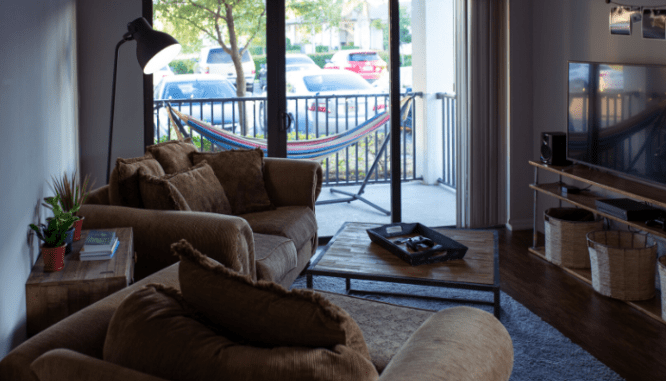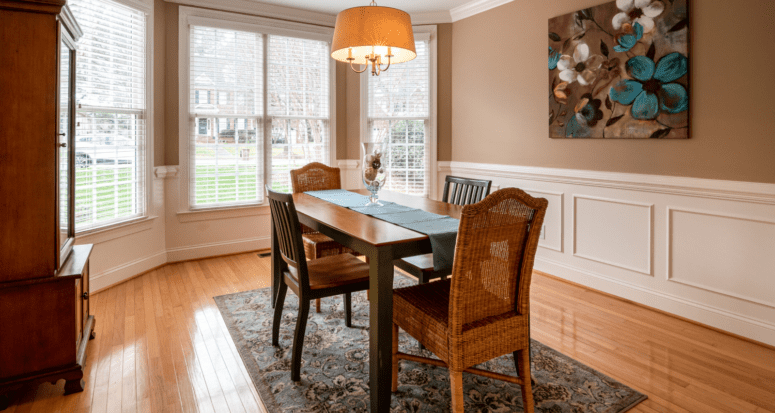Is Homeownership Worth It? 5 Arguments For (And Against) The Practice
- Published on
- 5 min read
-
 Blair Kaplan Contributing AuthorClose
Blair Kaplan Contributing AuthorClose Blair Kaplan Contributing Author
Blair Kaplan Contributing AuthorBlair has worked with everyone from small business owners to major universities to find their voice and tell their story — their way. When she's not busy surfing Pinterest for her dream home (complete with massive walk-in closet), she's busy utilizing her law degree to write for attorneys and real estate professionals.
Since you were young, you’ve dreamed about growing up and buying a house with a white picket fence. In fact, according to the National Association of Realtors, about 75% of current non-homeowners and 90% of homeowners believe that homeownership is essential to the “American Dream.”
But now that you’re at a point where you can start seriously considering the idea, you have to wonder: Is homeownership worth it? The answer depends on your personal situation, so let’s walk through the pros and cons and give you the tools you need to decide for yourself.

Why homeownership is worth it
1. You’ll build wealth
You have to live somewhere anyway, right? When you purchase your own property, you’re building equity instead of putting money in someone else’s pocket. Building wealth can help you to stop living paycheck-to-paycheck, as most Americans do.
Real estate has always been a great investment. Experienced real estate agent Brad Page, who’s worked with 82% more single-family homes than the average agent in Savannah, Georgia, agrees.
“If a chunk of [a] monthly payment — whether it be $1,000, $2,000, or whatever — is going toward the principal rather than paying the landlord… it’s always going to be an investment in yourself versus somebody else.”
This is not to say that investing in a home is entirely risk-free, but it’s often worth any risk, as homes tend to increase in value over time. In fact, according to The New York Times, the average homeowner’s net worth is 36 times the net worth of the average renter ($195,400: $5,400).
2. Homes tend to increase in value over time
Not only does the value of real estate generally increase over time, but when you sell your house, you’ll get back any equity you’ve built. You can improve and upgrade various parts of your home, which, depending upon several factors, usually will increase the value of the property, too.
At the very least, housing supply and demand will continue to push the value up to keep up with inflation. Although home value appreciation varies depending upon the index calculating it, the Case-Shiller Index found that from 1987 to 2009, the price of existing homes increased by 3.4% annually.
3. You might be able to afford a bigger house than if you rent
Unlike when you rent, when you buy a property, your monthly payment will likely be smaller. This is because while buyers are paying a mortgage, landlords must factor their mortgages, taxes, insurance, and maintenance fees into monthly rent, then tack on some extra in order to turn a profit.
The biggest hurdle when buying a house is saving up for a down payment. However, even that can be figured out. “There are so many low- or no-payment programs available right now,” Page shares.
“There are all kinds of ways to get into a house without pulling a lot of money out of your pocket, including building and closing costs.”
4. Your monthly housing payment won’t change drastically
“Rents continue to go up and up and up, and you want to have a mortgage payment set for anywhere from 15 to 30 years,” says Page. “So your costs should not go up other than taxes and maybe insurance — and could possibly even go down.”
You are also always able to take advantage of current interest rates by refinancing, pulling out equity, or lowering your mortgage payments. But remember that as long as you keep the same fixed-rate mortgage, you will basically have a fixed cost of living.
If that’s not reason enough, bear in mind that not only will your monthly housing payment remain stable, but you may actually save some money. Many homeownership costs, such as property taxes, are tax-deductible.

5. You’ll have more privacy and peace of mind
Your lifestyle can often factor into whether homeownership is worth it. Owning your own property can provide peace of mind for families dealing with…
Children and pets
A lot of homes offer more space, sometimes including outdoor space. Additionally, if you don’t want to risk your kids having to change schools, buying a house is a great option because it creates stability and puts roots down.
When you rent, you are always at the risk of a landlord not renewing your lease, selling the property, or jacking up your rent to a price you can’t afford.
Retirement
If you are able to purchase a home and pay off the mortgage entirely (or at least substantially) over time, it can prove extremely beneficial when you decide to retire.
Once you retire, you’ll likely live on a fixed income, with lower earning power and rising costs of living (inflation). The last thing that you want to have to worry about is how you’re going to afford your rent every month.
Even if you’re still paying property taxes, insurance, landscaping, or any other home maintenance, it’s still likely to cost you less than renting. Plus, if you decide to downsize in your golden years, you can sell the house, purchase a smaller property, and turn a profit to boot.

Why homeownership is not worth it
1. Saving up for a 20% down payment takes a long time, especially in certain markets
While buying a home will increase your net worth due to appreciation and inflation, it doesn’t matter how much equity you could have in a home if you need the money right now for other necessities. According to a 2018 Apartment List study, millennials require at least a decade of saving to be able to purchase a home.
2. If you don’t stay put, you could lose money
Renting allows for a lot of flexibility in terms of traveling and moving. But when you own a home, you have to wait until it sells before you can move.
The rule-of-thumb used to be that you should stay in a home for three to five years in order to make a profit — or at least to offset the costs of buying and selling. However, now that length of time has increased to seven years. And of course, a lot depends on the state of the market when you buy and when you sell.
Whereas one homeowner who bought five years ago and now has $600,000 in equity may be able to sell their property for a profit tomorrow, another may have refinanced and used that cash to take care of other bills. For the latter, breaking even may require them to stay in the home longer.
3. You’re responsible for a lot, financially
You may find your landlord irritating, but there’s no denying that less responsibility is on your shoulders when you rent. One of the biggest things that first-time homebuyers don’t consider is that when you own your own property, you are the one responsible for fixing any problems and for maintaining the house.
Page advises his buyer-clients to not spend all of their money on the property itself so that they have enough money to put aside each month in case of an emergency. Unfortunately, a lot of buyers don’t take that into account when they make the purchase and end up inadvertently overextending themselves financially.
“When something comes up like a roof or a broken toilet or something like that, you just can’t — you’re not going to be able to call on the landlord — you’re going to have to take care of that yourself.”
In addition to potential repairs, you’ll also have to pay for some extras, such as property taxes and insurance. Although some landlords require renters to purchase rental insurance, it’s usually a lot more affordable than homeowner’s insurance. Outside of a mortgage, owning a home costs the average American $13,153.

4. You might be subject to an HOA’s rules
When you purchase a home, you may also be subject to an HOA. An HOA is an association made up of property owner volunteers; The HOA implements restrictions and conditions for the upkeep and maintenance of all properties within the association. HOA rules vary, but they can encompass everything from holiday decorations to what type of plants or trees you can add to your landscaping.
If you purchase a property that’s in an HOA community, you are automatically a member and must adhere to all HOA bylaws. Those who choose not to abide by the laws will likely receive a warning. If they still do not comply, they will receive a fine. If the homeowner does not pay the fine, he or she will incur late fees; In some states, the HOA may choose to put a lien on the home and possibly foreclose on it.
As of 2018, one in four U.S. residents was living in an HOA community, and 61% of new housing built for sale was within an HOA. There were more than 347,000 HOA – communities in the U.S. in 2019.
Residing in an HOA community is not the right fit for everyone. So if you want to decorate as you see fit, a rental may actually be a better choice — it all depends on the specific contract.
5. You might be able to make more money with other investments
There’s no doubt that a home can be smart financially, but that doesn’t mean it’s the best investment that there is. Even if owning is less expensive than renting, purchasing a home is costly, and you aren’t going to see any profit (if you see any profit at all) for a long time.
If you are simply looking for an investment, you may want to choose to invest in stocks. Not only are stocks much more liquid, but with stocks, you have lower transactional costs, a greater variety of options, less work and maintenance, potentially fewer ongoing taxes, easier hedging, and a higher rate of return (historically about 7% to 9% per year, compared with 2% to 4% for real estate).
So if you’re wondering whether to invest that nest egg in your savings account in a down payment for a house or whether it would perform better in the stock market — if you’re planning to invest it for sure one way or another, the stock market is probably the financially smarter decision.

So what’s the verdict?
Whether or not homeownership is worth it really depends on your short- and long-term goals.
If you’re going to be in the same place for several years, you have kids or dogs, you would like more space to work on hobbies, or community is important to you — homeownership is probably worth it.
However, if you’re planning on moving in the next few years, you don’t want to be responsible for maintenance, and you think you could make more money investing elsewhere (and plan to actually do it) — homeownership might not be worth it.
If after weighing the pros and cons you are still unsure as to whether renting or buying is a better choice for you, there are many helpful online tools that can help you figure out whether a monthly mortgage payment would be lower than the cost of your monthly rent. And if you have additional questions, it’s best to consult with a qualified real estate agent who can help.
Header Image Source: (Curtis Adams / Pexels)
